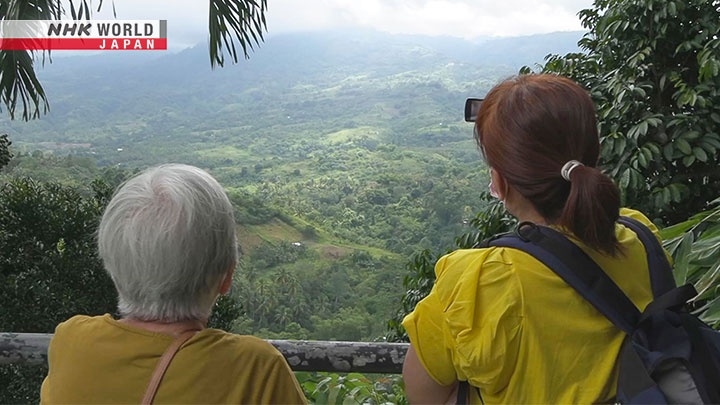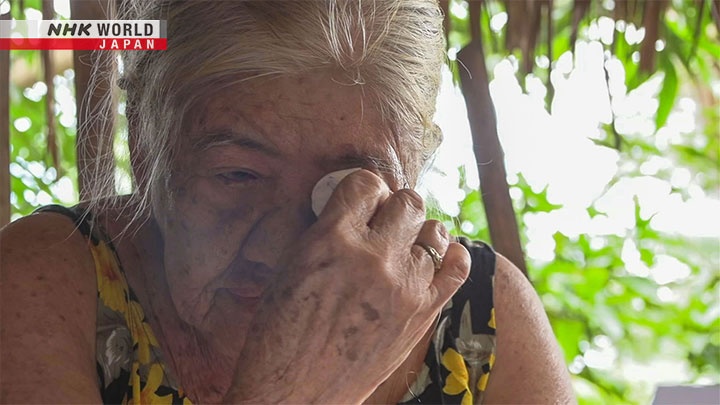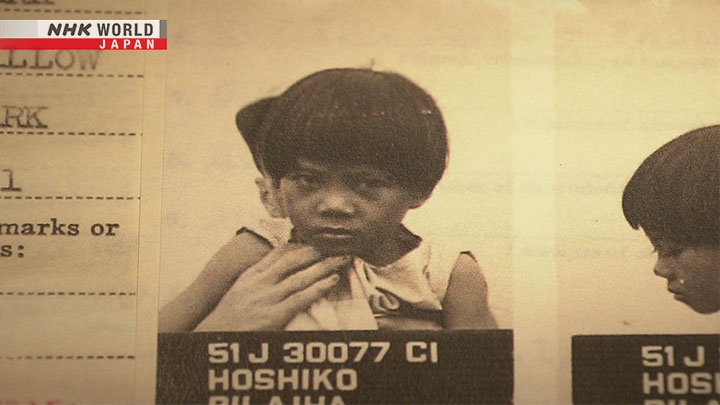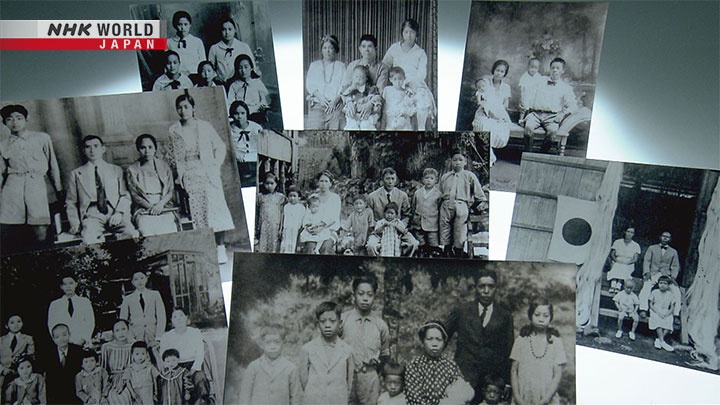World War II tore apart families of Japanese immigrants in the Philippines. For eight decades, they have been dreaming of being reunited. But time is fast running out.




Transcript
Miyagi Teruko, in her twilight years, is visiting Mindanao in the Philippines, for the seventh time.
The Japanese woman is desperately searching for her siblings who went missing there during World War Two.
But traces to that past are fast vanishing.
I don't know what to do.
Philippine-based Haruko Pelagia is also haunted
by being separated from her siblings after the war - and never being reunited.
I promised to see my sisters again, but...
The clock is ticking, but these women are hanging on to their last hope.
Torn Apart: Enduring Dream to Reunite.
Japanese who were raised in Davao in the southern Philippines, during and before World War Two,
gather for the first time in four years due to the pandemic.
Let's go there again - at least one more time.
They have regularly visited Davao to pay respects to loved ones who died in the war.
My two younger brothers were killed in mortar attacks.
Davao was a major hub for the cultivation of abaca, the raw material of hemp.
Rope woven from the fiber was in high demand for military use.
Starting in the early 20th century,
many Japanese moved to the Philippines - then under US colonial rule - seeking opportunity.
At its peak, about 20,000 had settled in Davao.
For many, life was good.
But then... in 1941... Japan's military invaded the Philippines.
Japanese were instructed to follow their strict orders.
Eventually those eligible were drafted,
getting caught up in the fierce battles between the US and Japanese forces.
Some 9 thousand reportedly died.
Families were torn apart, scattered... contacts lost...
Miyagi Teruko's story goes like this:
Born to a Japanese couple, who cultivated abaca, she was sent to her grandparents in Okinawa for education.
In the war's aftermath, she lost contact with her family back home.
Do you know where your family was during the war?
We have no idea.
My mother was in Okinawa then.
Teruko is the eldest daughter of 10 children.
Her older brother, who had moved to Okinawa with her, died in the war.
But of her family in the Philippines...
I don't know whether they are alive.
I look for them but in vain.
During the war, Okinawa also became a bloody battlefield.
In fact, Teruko is the sole survivor of her family there.
To get by she worked at places like US military bases.
In the 1970s, she could finally begin tracking down her kin.
She visited Davao with her husband and daughter.
Her third visit in 1980 proved fortuitous - she found her younger sister, Etsuko.
Separated from her family in the chaos of the battles,
she was raised by members of the local Bagobo tribe.
The deep sense that her brothers and sisters are still alive is what has driven Teruko in her tireless quest.
In this, her daughter, Tomoko, has been a staunch supporter.
Out of my ten siblings I was only able to find Etsuko.
The others were so young at the time.
Did you always think they were alive?
I did.
But I have never found them.
Since I was a little girl, my mom has been telling me her recurring dream.
In it, her mother asks her to find her younger sister Reiko.
I think that's one of the reasons she can't give up her search.
And so, Teruko never ceases looking...
A cruel destiny lay ahead for children left behind in the Philippines after the war.
They had to hide their roots for decades due to strong, lingering anti-Japanese sentiment.
Japan's Foreign Ministry has confirmed over 3,800 second-generation descendants,
many of whom were marginalized in society.
A Tokyo based NPO, Philippine Nikkei-jin Legal Support Center,
has been investigating the cases of these descendants.
Haruko Pelagia, who lives in Mindanao, was born to a Japanese father and a Filipina mother.
After the war, you did not use your Japanese names?
Like Haruko or Yoshiharu?
We didn't, because our mother was afraid.
Filipinos at that time despised people with Japanese blood.
An NHK crew visits Haruko.
After the war, her father was forcibly repatriated to Japan by the US military.
My father cried. He couldn't even look at us.
We also cried and searched for him.
Fond memories are all she has now - like when he would simmer sardines in miso paste.
When we were small, my father prepared the side dishes.
Japanese would add sugar to the fish broth.
He was sent to Japan with his three eldest children.
The six younger ones, including Haruko, remained behind in the Philippines with their mother.
Life was tough.
Haruko couldn't even attend elementary school.
She remembers a single letter coming from her father, but no further contact.
All along, she dreamed of reuniting with him, her brother and two sisters.
I promised to see my sisters again, but this hasn't been possible.
Then a breakthrough...
the Tokyo-based NPO discovered that her father was listed in the US military's Japanese internment records of August 1945.
Hoshiko Suezo was 46 at the time.
The group cross-referenced his name in immigrants' lists and learned that he was from Kumamoto Prefecture in southwestern Japan.
Haruko was also noted in the record.
Once the NPO learned her father was from Kumamoto they discovered the whereabouts of Haruko's siblings in Japan.
A team from the NPO visits Haruko.
We received a photo of your older sister Miyoko.
We were able to contact her family.
She has a child.
The photo arrived this morning.
Miyoko.
How are you feeling?
I'm touched. We're sisters.
Miyoko passed away 14 years ago.
She raised children and lived to be 82.
She was the last of Haruko's family in Japan.
I haven't been able to see my siblings.
Yet now that I'm old, I see a photo of one of them...
And I can't help but think of them.
I can't help but remember them.
Too much time elapsed.
Her dream of a reunion now also, painfully, a thing of the past...
In September, Miyagi Teruko and her daughter Tomoko arrive in Davao.
First, they head to Teruko's hometown of Pantukan, about a 2-hour drive from the city.
Together with the NPO, they visit an administrative office.
They discover family birth records, including her missing siblings'.
- Takemitsu.
- Takemitsu.
This seems to be Takemitsu's...Her younger brother.
- Can you back, back? This one... Deiko.
- Reiko.
Fourth child.
Reiko, who Teruko tenderly looked after - the younger sister of her recurring dream...
- So, after 1942?
- We have no records.
For Teruko, the trail ends again with the war.
Perhaps the site of her childhood home will offer clues.
How far is it from here?
It's not that far, maybe 15 minutes.
Tomoko recalls it's deeper inside the palm grove.
I remember that plant.
Tomoko is certain this is where Teruko's home was located.
Did Japanese live here?
My dad said they did, but we don't know.
So, do you know their surname?
Only the older folk knew them. We have no information.
Once upon a time, Teruko and her entire family had lived in a large house here in peace...
Now it seems as if this was just an illusion.
Seeing the ocean reminds Teruko of her carefree childhood days.
When her father carried hemp to the local port, she often tagged along.
After, she would play in the water.
We brought hemp to a shop.
So, you went to the beach.
Teruko and her daughter are pursuing any lead - no matter how small -
to help track down the brothers and sisters born here.
Running out of options, they are back in Davao and visiting San Pedro Cathedral.
It's a long shot... but church records may shed some light...
The records stored here are of Christians.
We may find baptism records.
So, we have asked for them.
Not only children, but others may have been baptized.
We'll try anything.
It's possible that after the war the younger siblings were baptized and raised by other families.
I don't know what your mother did.
What she did with the children.
She may have entrusted them to someone.
My parents may have died.
They may have asked someone to take them.
If so, that's OK.
The church staff check marriage records, but find no names suggesting the missing family.
- I'm sorry, none of you.
- What am I to do?
But the NPO's team receives fresh information.
We heard that there were possibly two Japanese siblings.
They were adopted by Bagobo families during the war.
We checked their ages, but first please look at their photos.
These two.
The NPO learned that they lost their parents in the war and were raised by Bagobo, which sounds similar to Etsuko's case.
The woman was a baby at the war's end.
The man was about three.
Considering their ages, they just could be Teruko's kin.
Though they had passed on, their children are alive.
- Their children want to meet you. Would you like to?
- Yes.
Meeting in person is different.
When we met my aunt Etsuko, our plan was the same, 'Let's just go and meet her.'
Such a small chance led us to her.
And so, Teruko and Tomoko find themselves in a mountainous area in northwestern Davao.
The children are waiting.
Are they the nephews and nieces of Teruko?
Tomoko tries to get a sense...
Where were the orphans found?
The person who knew is dead.
Do you have anything associated with them, like clothing?
There might have been something. But we don't have anything.
The orphaned woman's kids pull out a photo of their late brother - the one who most took after their mother.
- Any resemblance?
- Doesn't look like him.
He doesn't look like my dad.
I think we need to talk to older relatives.
The children don't seem to know much.
To meet with key senior family members, their journey takes them deeper into the mountains... to this hamlet.
Teruko is introduced to the orphaned man's "Bagobo" sister.
Does she know from her parents how they found her brother during the war?
I'd like to hear anything about that time.
My father saw him in the mountains.
Near the Tamugan river.
During the last months of the war, many Japanese fled to the Tamugan area to hide from their enemies.
Did you notice words that you couldn't understand?
If you can remember.
Yes. We couldn't understand him for a long time.
Was he speaking Japanese? Probably.
But was he the long-lost brother?
There was nothing to suggest it.
Without any evidence, Teruko and Tomoko hit another dead-end.
The last stop of their visit... a cenotaph built in Tamugan.
They can see the mountains where thousands of Japanese civilians were reportedly killed during the war, tearing families apart.
Was my family there?
I don't know. Probably, someone.
Had Teruko's siblings moved around in the mountains to escape harm in the last stages of the war?
Their seventh visit hasn't provided any answers.
I've been the parent figure because they're gone.
I have a responsibility to take care of my younger siblings as the eldest.
But I don't know what to do.
I've tried my best, but they are still missing.
When I imagine what my mother is going through, I feel sorry for her.
My mother will keep searching for her siblings while she is alive and will keep talking about them.
When she passes away in the future, I will always remember them in some way.
For more than half a century, Teruko has kept searching, never letting go of her dream.
But with no traces of beloved family, her war endures...